Forbidden Broadway: Behind the Mylar Curtain (32 page)
Read Forbidden Broadway: Behind the Mylar Curtain Online
Authors: Gerard Alessandrini,Michael Portantiere

Part of the madness of Forbidden was the confined space. There were no wings
whatsoever, and the dressing room was the size of my pinky. We had four adults in
there, throwing things around and changing costumes for ninety minutes. It was a
whole other show backstage.
A really wacky experience that sticks in my mind was one night when I was doing
"Chita/Rita." After that, I had to do the Merman number. So I was wildly changing
backstage, and somehow the Chita wig got caught under the tulle of my Merman dress.
I was in the middle of the number before I realized there was something wrong-so
I reached into the dress, pulled the wig out, and improvised for a few seconds. There
were always things going wrong like that, but it was a blast.
I loved doing Bernadette Peters. Gerard wrote this very funny number to the tune
of "Tell Me on a Sunday" from Song and Dance; it was called "See Me on a Monday,"
and it was all about Bernadette telling the audience to come see the show when she
was rested, because she was having vocal problems.
It was fun to meet all the celebrities who came to the show. I met Mary Tyler Moore,
Diane Sawyer, Shelley Winters! At one point, our opening number had a reference to
Mary Beth Hurt, of all people. So there we were, belting out her name over and over,
and I noticed her sitting in the audience. It was so odd.
For me, one of the greatest things about Forbidden Broadway was that I got a
Hirschfeld in Enid Nemy's column in the New York Times. The reviews for the show
had been terrific, and the press rep called me up and said, "You're going to have a
Hirschfeld!" It was a really big deal. I spoke with Margo Feiden, whose gallery handled all of his art. She called me and said, "I can't wait to show you this gorgeous portrait."
I said, "How much would it cost me to buy it?" She said, "Are you sitting down? It's
twenty-five hundred dollars." That was a lot of money for me back then, so I put away
$25 a week, and about three years later I was able to buy the Hirschfeld. I'm glad I did,
because it's pretty stunning; you can see the pencil line where he sketched it, and he
got my eyebrows and posture really well.
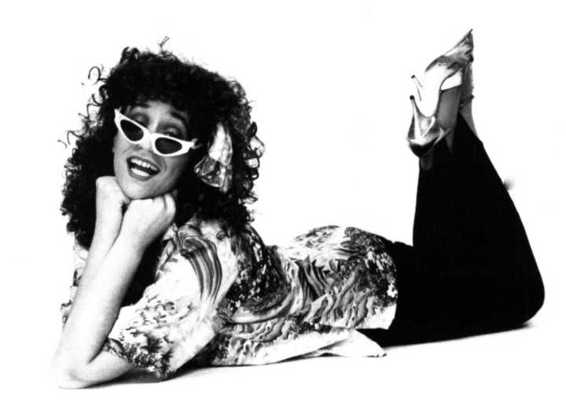
Barbara Walsh spoofs Bernadette Peters in Song and Dance.
I'm very proud that I'm in the select group of people who were in Forbidden Broadway and later had someone else parody them in the show. Janet Dickinson did a great
job of imitating me as Joanne in Company. I went to see the show with Raul Esparza,
and he seemed to enjoy his parody-but I think I laughed at it a little more than he
did!
At the end of the '80s, most of the good shows on Broadway had been running for years,
and that laid the groundwork for the British invasion. Cameron Mackintosh and Andrew Lloyd Webber had become tremendous creative forces, plus it was much cheaper
to produce shows in London at that time.
The dollar was very strong, and a lot New
Yorkers were visiting London and talking
about what was going on there: "Have you
seen Les Miz? Have you seen Phantom?"
We thought we should move Forbidden
Broadway to a different venue and make
it more of an Off-Broadway show than a
cabaret entertainment. So we closed the
show for a while; it wasn't running in New
York from September'87 to September'88,
but it continued to play in Boston at the
Park Plaza Hotel. We introduced a lot of
new material there, including the first versions of the Phantom and Les Miz numbers.
I was dating a very talented man named
Phill George, and when I went to Boston
to work on the show, I asked him to come
along. He subsequently took over one of
the roles and started to help choreograph
some of the numbers.
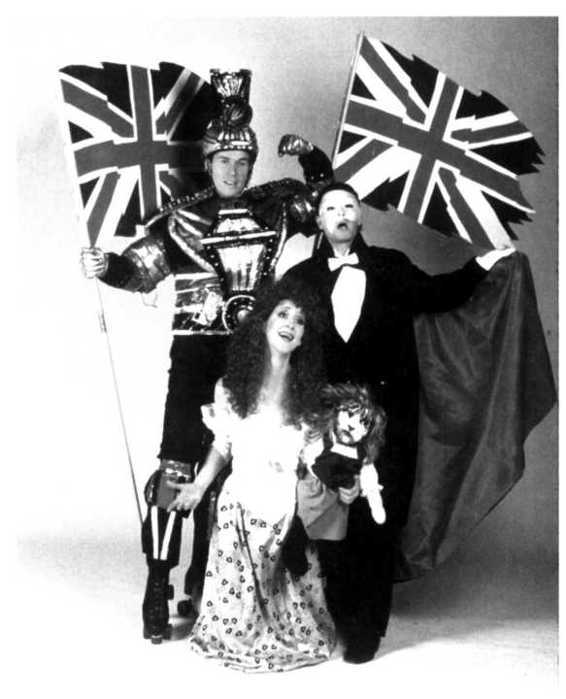
David B. McDonald, Michael McGrath, and Roxie Lucas spoofing
British musicals.
Meanwhile, in New York, I was trying to
put together a new production company. I
negotiated to move Forbidden Broadway to the Village Gate, which in the '70s had been popular with shows like Scrambled Feet,
but that deal fell through. I went to my lawyer, the brilliant Mark Sendroff, who has
guided the show and my career since 1983, and asked
him for advice. He suggested that we move to Theatre
East, a little-used venue on East 60th Street, and that
Jonathan Scharer should take over as producer. Jonathan
set up a production company, brought Glenna Freedman
in as our press agent-and in no time at all, we were
hanging our Mylar curtain at Theatre East, ready to spoof
the British invasion.
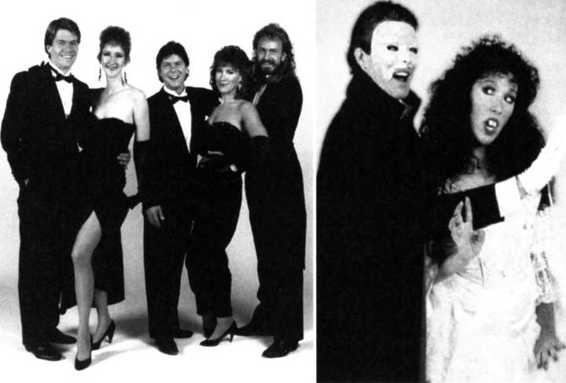
Left: David B. McDonald, Roxie Lucas, Michael McGrath, Toni DiBuono, and Phil Fortenberry. Right:
David B. McDonald and Toni DiBuono in "The Phantom of the Musical:'
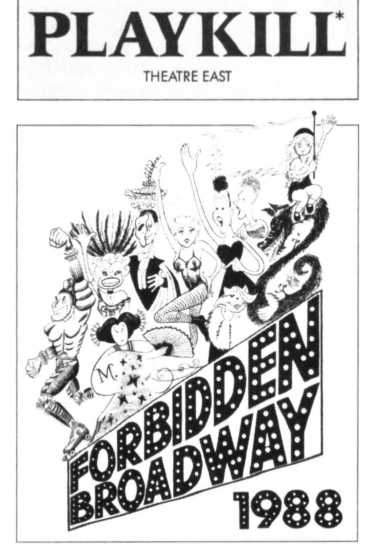
Obviously, Les Miz and Phantom and the other British
shows struck a chord with people. I think that's largely
because they were operettas, although that dirty word
was never used in the marketing. No one had done operettas on Broadway for decades, and there's something to
be said for them. All of the British shows have the weight
of operas in terms of their dramatic stories and huge
scenic productions, but the music is easily digestible,
so the audience can readily pick up the tunes. You don't
have to listen to those scores ahead of time in order to appreciate them. Also, because the Brit shows are through-sung and don't have to
pause for spoken dialogue, it's easy for them to keep up a high level of energy for the
entire performance.
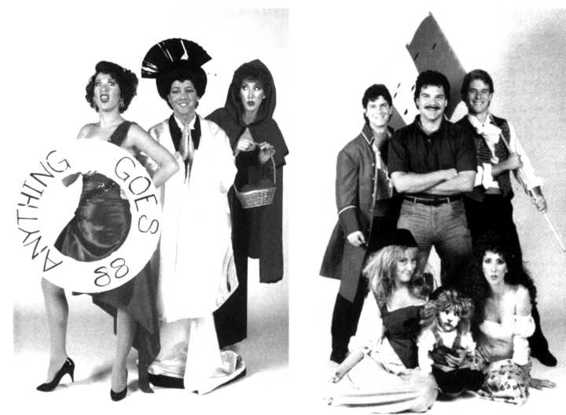
Left: Toni DiBuono (as Patti LuPone), Michael McGrath (as M. Butterfly), and Roxie Lucas (as Little Bad Riding
Hood). Right: Gerard and the 1988 cast.
Of course, the tone of Forbidden Broadway changes with the type of shows that are
spoofed, according to whether they're fluffy or dark or very broad. During the British
invasion, our show seemed very British. That was the first time people suggested we
should bring it to London.
I think Forbidden Broadway really came of age in the late '80s; the production values
increased and the comedy became more exact. What we lost in terms of "Hey, kids,
let's put on a show" charm, we gained in terms of sharpness and focus. For example,
we had spent years honing the Merman-Martin number, but it really "hit the heights"
when Toni DiBuono and Roxie Lucas did an exact character analysis and vocal imitation of those two great stars. Among the other Broadway luminaries we spoofed were Elaine Stritch, Madonna, and B. D. Wong. We also had a devastating lampoon of Patti
LuPone in Anything Goes, singing "I Get a Kick Out of Me."
But stars were becoming less integral to the Broadway scene as the big-budget Brit
musicals became the stars. Though people loved Cats, Les Miz, Phantom, and Miss
Saigon, all of those shows were ridiculous in a way, because they were so huge and
melodramatic. In other words, they were just perfect for spoofing. That was a major
reason why we felt we should move our show into an Off-Broadway theatre and add
more costumes; Forbidden Broadway was an established hit, and it looked like we
were going to be around for a while.

"Fugue for Scalpers"